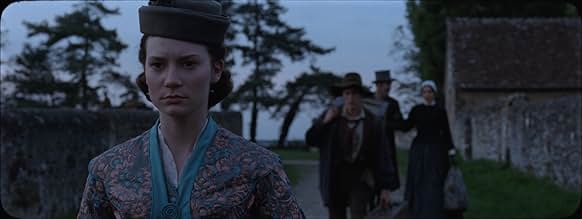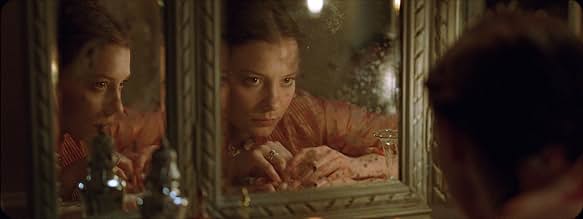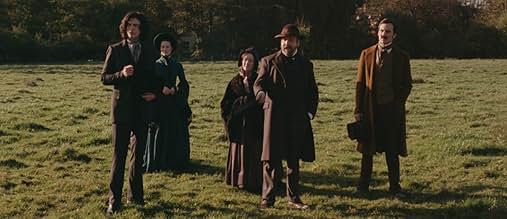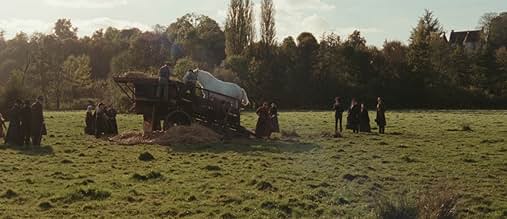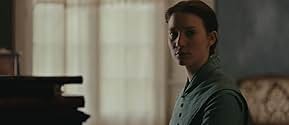Da sie die Ehe mit ihrem Mann, einem Landarzt, schrecklich langweilt und das Leben in einer Kleinstadt sie beinahe erstickt, verfolgt die unstete Emma Bovary mit alle Mitteln ihren großen Tr... Alles lesenDa sie die Ehe mit ihrem Mann, einem Landarzt, schrecklich langweilt und das Leben in einer Kleinstadt sie beinahe erstickt, verfolgt die unstete Emma Bovary mit alle Mitteln ihren großen Traum von Leidenschaft und Erregung, koste er was er wolle.Da sie die Ehe mit ihrem Mann, einem Landarzt, schrecklich langweilt und das Leben in einer Kleinstadt sie beinahe erstickt, verfolgt die unstete Emma Bovary mit alle Mitteln ihren großen Traum von Leidenschaft und Erregung, koste er was er wolle.
- Regie
- Drehbuch
- Hauptbesetzung
- Auszeichnungen
- 2 Nominierungen insgesamt
- Recital Singer
- (as Romeo Fidanza)
- Recital Singer
- (as Sophie Féjoz)
Empfohlene Bewertungen
The whole plot involving Leon's legitimate reasons for visiting the house is mangled, as is the genesis of the attempt by Charles to correct Hippolyte's medical issue and the surgery's outcome. Boneheaded decisions abound, such as the decision to change the sumptuous, romantic ball that quickened Emma's economic and sensual envy into a grubby, sweaty stag hunt. Worst of all its many bad decisions, this film totally eliminates the Bovarys' baby daughter Berthe, whose existence is essential to our understanding of how huge the final tragedy really is and its domino effects far beyond Emma and Charles.
I rarely write reviews but, when such violence is done to one of the great works of world literature, I do get annoyed. Apart from a bit of recognition for production values including cinematography, sets, location detail, costumes, I have to give this sloppy, bloodless and point-missing attempt the welcome it deserves.
Mrs Barthes took more liberties with the novel than any of her colleagues,sometimes not for the best: it's really a bad idea to replace the Marquis' ball by a hunting with hounds : a ball is par excellence the place where a woman can shine,dazzle all the men around and outstrip all her rivals:Flaubert's depiction of the soiree ,which is the turning point of the novel ,reveals Emma's monotonous living,her longing for a socialite life ,for a romantic love story her meek oafish hubby cannot give to her;the Marquis ,becoming Emma's lover , led the screenwriters to do without Rodolphe Boulanger ,which may disappoint the readers.Gone is Emma 's daughter -she wanted a boy and she found her ugly- who landed as a working girl in a spinning mill ,ironical fate for a daughter whose mom wanted to climb the social scale.On the other hand,Lheureux,Emma's evil genius, is given a (too) prominent role ,and Monsieur Homais ,the atheist chemist hardly appears ,he 's only in it to urge Charles to operate on Hippolyte,the person with club- foot ;the scene in the church with the vicar is much weaker than its equivalent in Renoir's movie;the agricultural meeting fete is botched ,and passes over in silence the way Flaubert showed "the poverty of the century " ,in the shape of a very old lady who is awarded a medal after a life of hard labor.(Renoir did not forget that either)
The movie is not completely wretched though.Mia Wasikowska is a very credible Emma ,and even if her suicide may surprise Flaubert's readers,the final scene with these torches in the night is cinematographically dazzling(but the prologue which makes the movie a flashback is pointless);Charles Bovary(Henry Loyd-Hughes) is exactly how Flaubert depicted him,an unambitious good man with a small mind, whose main pleasure in life is to sit down at table and enjoy his meal;the wedding night -not shown in precedent versions- is revealing .To get a semblance of a luxury life,she's seized by a compulsive desire to buy mountain of things ,most of which are thoroughly useless.She lives in a world of illusion,even Leon (Ezra Miller)holds a second-rate position he may easily loose if he continues with his romance with a married woman.
This new version will probably not go down in cinema history.But ,even though the screenplay is eminently debatable,the cinematography is splendid indeed.
Everybody speaks softly especially Mia. Her dull life is filmed in long scenes which only accentuates the dullness and infects the movie with its dullness. At least, the dullness is quite convincing. Mia needs to pierce that dullness with more powerful passionate acting but she is going for callous and wanting. She is still the heroine. It's all very subdue. I'm no literary person and maybe she is supposed to be this way. I can't comment on the accuracy of the depiction. It would be more compelling for her to embrace the darkness. It is beautiful in a moody sunset period piece way but it doesn't have the exuberance. It's kinda dull.
Wusstest du schon
- WissenswertesThis is actress Mia Wasikowska's fifth period drama set in the 19th century.
- Zitate
Emma Bovary: I realized that before getting married I was contemplating my coming life like a child. In a theater, um... sitting there in high spirits, and eagerly waiting for the play to begin. It was a blessing in my early youth that I did not know what was really going to happen. When I look back now, it seems that I was like an innocent prisoner, condemned not to death, but to life, and as-yet unconscious of what the sentence meant. And the longer I live, the more clearly I feel that on a whole, life's a disappointment.
- VerbindungenFeatured in Der Fall Emma Bovary (2021)
Top-Auswahl
- How long is Madame Bovary?Powered by Alexa
Details
- Erscheinungsdatum
- Herkunftsländer
- Offizielle Standorte
- Sprachen
- Auch bekannt als
- Пані Боварі
- Drehorte
- Produktionsfirmen
- Weitere beteiligte Unternehmen bei IMDbPro anzeigen
Box Office
- Budget
- 7.650.000 € (geschätzt)
- Bruttoertrag in den USA und Kanada
- 44.235 $
- Eröffnungswochenende in den USA und in Kanada
- 20.841 $
- 14. Juni 2015
- Weltweiter Bruttoertrag
- 658.532 $
- Laufzeit1 Stunde 58 Minuten
- Farbe
- Sound-Mix
- Seitenverhältnis
- 2.35 : 1







